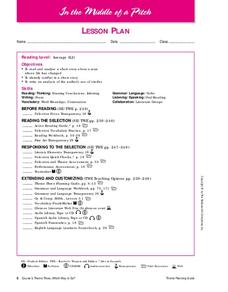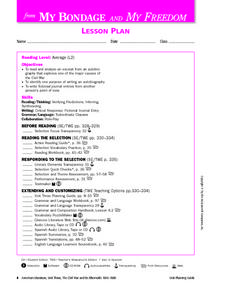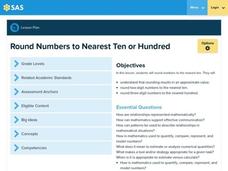Curated OER
Evaluating Sources
Students conduct research and evaluate the sources they find. They identify various sources from their research. They employ technology resources to improve problem solving and decision making skills.
Curated OER
Which Way To Go?
Students prepare for and respond to literature selections. This package of lessons includes nine lessons from the American Literature series, each covering a different reading selection about a man making a key life decision. Pre-reading...
Curated OER
American Literature, The Earliest Days
Students prepare for and respond to literature selections. This package includes eleven lessons from the American Literature, The Earliest Days: Prehistory to 1750 each covering a different reading selection. Pre-reading and response...
Curated OER
American Literature Unit Four
Students prepare for and respond to literature selections. This package includes twelve lessons from the American Literature, Regionalism and Realism: 1865-1910 series, each covering a different reading selection. Pre-reading and...
Curated OER
American Literature and the Civil War
Students prepare for and respond to literature selections. This package includes fourteen lessons from the American Literature, The Civil War and Its Aftermath: 1845-1880 series, each covering a different reading selection. Pre-reading...
Curated OER
Study Skills- Fact and Opinion
Young scholars engage in a variety of activities in order to achieve the objectives of a layered curriculum unit. They take notes on the differences between fact and opinion. Students also use a newspaper in order to recognize...
Curated OER
Dragonwings
Students engage in a lesson that is concerned with the literature study of Dragonwings. They write about the story from the perspective of a reader that is well informed towards the last chapters. Students also find target vocabulary and...
Curated OER
Protecting Habitats and Species
Students recognize that scientists continuously gather and interpret data to understand and predict relationships among natural phenomena. They research various volcanoes and plot the volcano locations on a world map.
Curated OER
Propaganda and Its Effects on WWI
Young scholars learn about propaganda. In this WWI lesson, students define the term propaganda. Working in groups, they are given a packet of postcards and posters used during WWI. They answer questions about their uses and write a...
Curated OER
Fingered Felons
Students examine fingerprints. In this biology lesson, students use sticky tape to create their own set of prints and identify patterns on each of their fingers. Students try to solve a "classroom crime" based on the patterns of a...
Curated OER
Immigration in Nebraska
Students will examine data and research the historical backgrounds of various ethnic immigrants. In this Immigration lesson plan, students will examine the impact of immigration on the state of Nebraska. Students will research a facet of...
Curated OER
Buying A Used Car
Young scholars learn of the rights automobile buyers have when purchasing a car.
Curated OER
Exploring United States vs. Hirabayashi
Students research the case of Gordon Hirabayashi vs. the United States. They research the case by completing a timeline activity and review the charges against him. Students review the entire case and discuss it from the perspective of...
Curated OER
Quilt Codes
Students list criteria to evaluate credible historical sources and defend their criteria in an essay. In this historical sources lesson plan, students review information of historical sources as well as the facts and pictures.
Pennsylvania Department of Education
Round Numbers to Nearest Ten or Hundred
Third graders review telling time. For this lesson on telling time, 3rd graders discuss various items that show length of time, including clocks, calendars and sand timers. Students review and practice what they already know about...
Curated OER
Getting Under Your Skin
Students design advertisements that promote and explain the science of new transdermal drug therapies to the general public.















